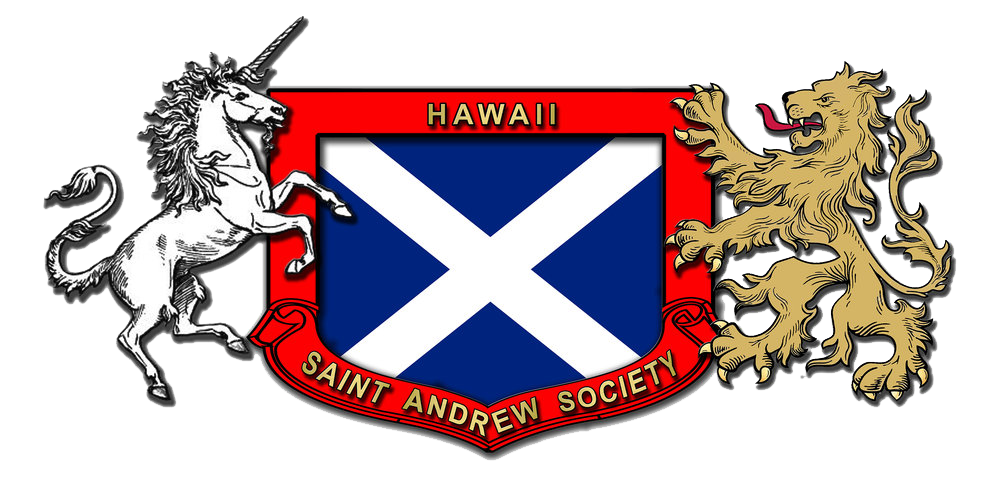Douglas Herring and the Hawaii Tartan - Haely Harlow
Douglas Herring and the Hawaii Tartan
This essay is about a Hawai’i-born man named Douglas Herring who designed and wove
an inspired tartan fabric that became the official tartan for the State of Hawai’i. As we know,
the tale of one person is more often complete when the people in their lives are acknowledged
as well. The Hawai’i Tartan is recognized world-wide and is celebrated as such every April 6th on
National Tartan Day. I think this is an important contribution to the art, history and culture of
Hawai'i. When I spoke to Douglas, or Doug, as he preferred to be called, he recalled that the
story of the Tartan all started with a persisting request to his mother, Alice Herring. Doug
wanted his mother to weave some tartan fabric. Alice was a long-time member of the Hawai’i
Handweavers Hui (HHH) on O’ahu and enjoyed weaving as a hobby. Her reply to Doug’s request
was always the same, that if he wanted some tartan fabric that he would have to weave it
himself. When I asked Doug why he wanted tartan fabric specifically, he replied thoughtfully,
and acknowledged that although he has different European nationalities in his ethnic
background, he identified mainly with the Celtic heritage, specifically the Scottish culture.
“That's why I specifically wanted some tartan fabric woven...[b]ecause it is so strongly identified
with Scottish culture.” (Herring)
In 1997 Doug decided to weave his very own tartan design. He had heard about an
upcoming competition sponsored by the HHH and the Caledonian Society of Hawai’i (CSH) to
design a tartan for judging at the annual Hawai’i Scottish Festival (HSF). He began to ponder the
design of his tartan. What colors would he use? Why would he choose these colors? How would
he structure his design? “I designed the Hawai'i Tartan to honor the Kingdom of Hawai'i, with
the colors of red and yellow...being the colors of the ali'i. The tartan was also designed with an
eye towards the origins of Hawai'i, as the red and yellow also symbolize the fire and lava that
created the islands. This can be observed by the pairing of the red and yellow and by the fact
that there are two distinct patterns of red and yellow... [reflecting] this dual nature. ...[B]lue [is]
for its oceans and skies, green for its forests and landscapes, [and] brown for the 'aina, the life-
giving soil.” (Hawaii) .
Doug had watched his mother weave for many years so he was comfortable with setting
up the loom and the rest of the weaving process. He slowly, carefully, and precisely wove his
first ever piece of fabric. He submitted this work of art at the Festival, and won! I asked him
about how winning the competition made him feel, to which he replied, “Honored...I am
profoundly grateful to the attendees of the 1997 HSF—not just those who voted for my design,
but for all those who voted for any of the design options—Hawai’i's Tartan was selected by the
public, not by a committee.” (Herring) He also recalled that upon winning, one of the organizers
of the contest arranged for the international registration of the tartan. It was “registered in
Scotland with the official Scottish Tartans Authority (Crieff, Perthshire) as the [Hawaii or
Hawai’i] Tartan, with the International Tartan Index number 5163, under the category of an
American State Tartan.” (“Hawai’i Tartan”).
After the whirlwind of designing the winning tartan and having it registered, Doug and
proud mother Alice made swatch-size samples and scarves for the following year’s Festival. I
spoke with Hamish Burgess, who is now the largest vendor at the HSF Highland Games, about
the part he played in the life of the Hawai’i Tartan. He recalled asking what Doug wanted to see
happen with his tartan, and remembered that Doug wanted to see people wearing the design.
(Burgess) Hamish took swift action and within a year the first 75-yard bolt of heavyweight wool
Hawai’i Tartan was made! Since then, the Hawai’i Tartan has been made into kilts and worn at
the HSF and beyond. Doug was pronounced when he asserted his gratitude to both Mr. Burgess
and a man named Hardy Spoehr, both of whom readily promoted the Hawai’i Tartan, and both
of whom were instrumental in getting the Hawai’i Legislature to recognize Doug’s tartan design
as the official tartan for the State of Hawai’i in 2008. In 2009 Doug was presented with the Scot
of the Year award by the CSH, in honor of his contribution to the Scottish community in Hawai’i.
(“Scot”) I asked Doug if he owned the design or if it is part of the public domain. Doug stressed
that the Hawai’i Tartan is part of the public domain. He gave up all controlling-interest to it
because he “did not want any barriers to it,” he believes that “anyone with Aloha in their heart”
should be able to proudly wear the Hawai’i Tartan. (Herring) To me, this not only captures the
proud spirit of Aloha but also honors the proud Scottish tartan heritage in Hawai’i.
Works Cited
Burgess, Hamish. Personal Interview. 10 April 2018
Hawaii. Legislature. House. Committee on Tourism and Culture. House Concurrent Resolution.
81, March 31, 2008. Web. 10 Apr. 2018, www.capitol.hawaii.gov/session2008/testimony/HCR81_TAC_03-31-08_.pdf
“Hawai’i Tartan.” MauiCeltic, 10 Apr 2018, www.mauiceltic.com/hawaii-tartan.htm
Herring, Douglas. Personal Interview. 11 April 2018
“Scot of the Year” Caledonian Society of Hawaii. 12 April 2018,
www.scotsinhawaii.org/Scot_of_the_Year
